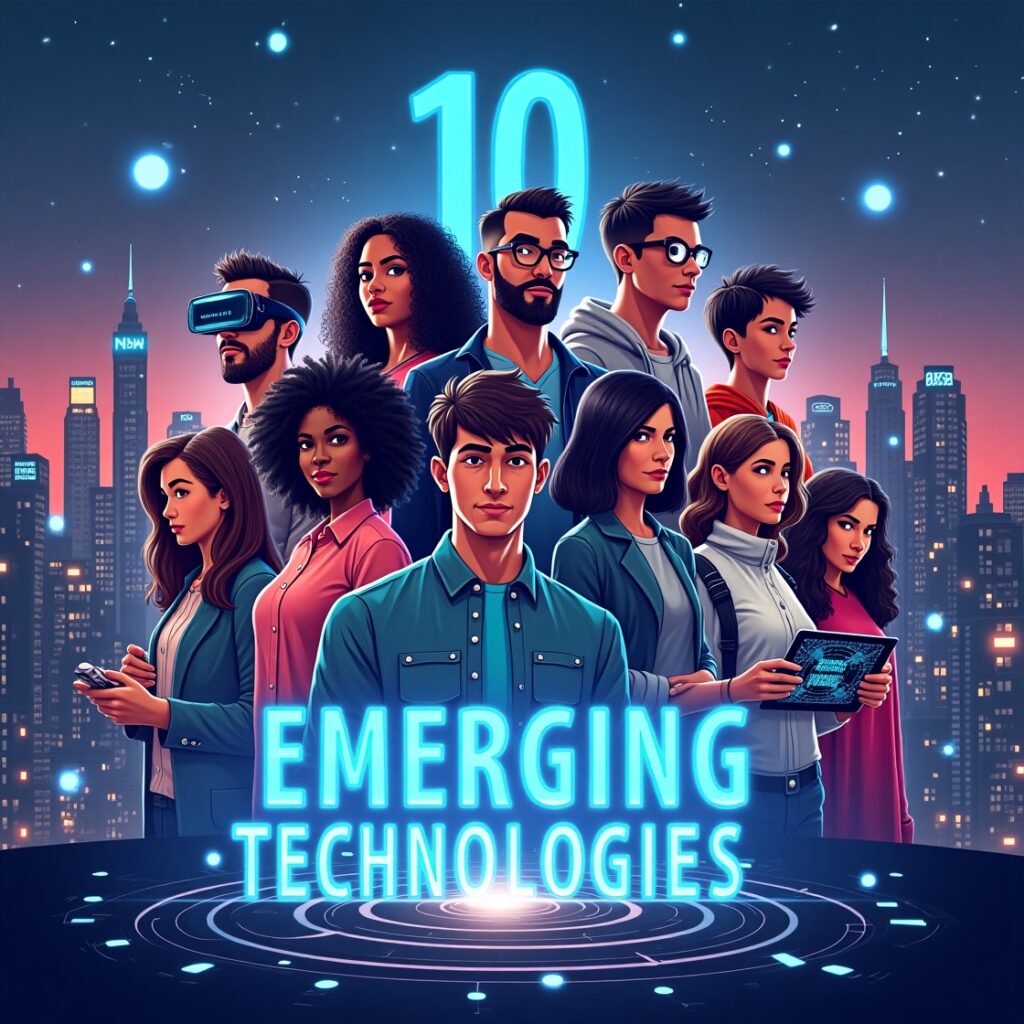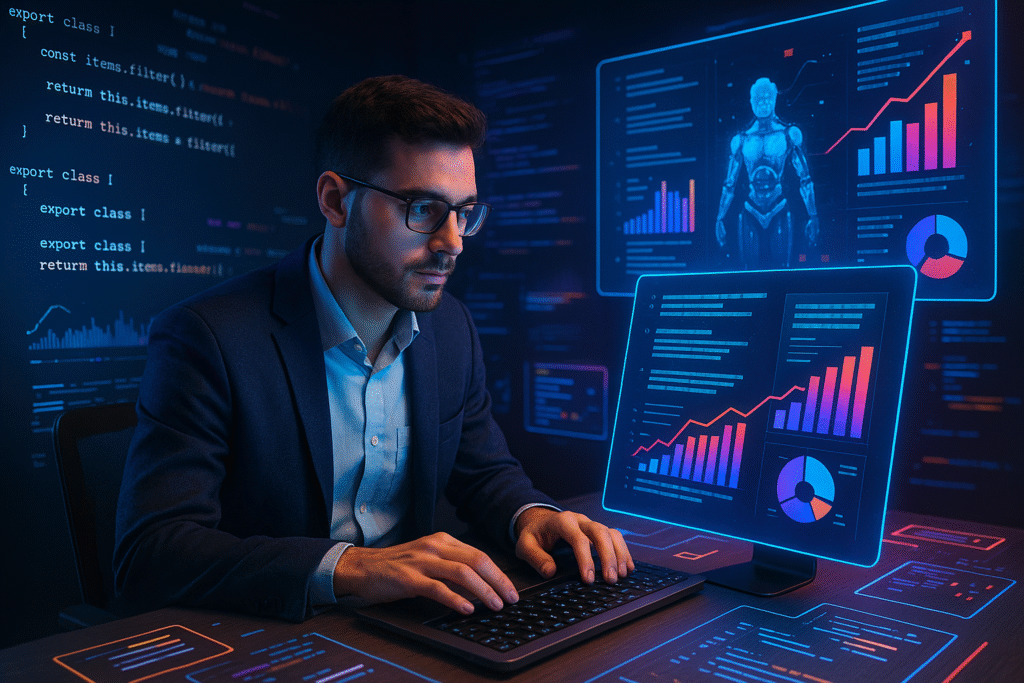🔮 10 Emerging Technologies That Will Transform the World by 2025

Have you ever imagined what life will look like just a few months from now? We often think of futuristic technology as something out of a sci-fi movie—flying cars, talking robots, brain-reading devices—but guess what? The future is arriving faster than ever, and many of those once-fantastical ideas are becoming our reality.
With scientific breakthroughs and emerging technologies happening almost daily, 2025 is set to be one of the most transformative years in human history. New inventions are not only changing how we live and work but are also redefining health, education, creativity, energy, and even life itself.
In this blog, we’ll explore 10 truly game-changing emerging technologies—from artificial intelligence that writes code and creates art to computers that read your mind. Whether you’re a techie or just a curious reader, get ready to learn how these innovations will affect you, your family, and the entire world.
🧠 1. Generative AI 2.0: Creativity with a Code
You’ve probably heard of ChatGPT or seen AI-generated images flooding social media. But that’s just the start of what Generative AI 2.0 can do. By 2025, this emerging technology will go far beyond simple text or pictures.
Imagine telling an artificial intelligence to create an entire movie script, compose a song, design a virtual 3D space, or even write complex computer code—all from just a single prompt or voice command. That’s the power of Generative AI 2.0.
🌟 Where You’ll See Generative AI 2.0 in Action:
- Education: Personalized artificial intelligence tutors that understand your learning style and help you grasp concepts faster and easier.
- Entertainment: AI-generated films, stories, video games, and music created collaboratively with humans, opening new creative possibilities.
- Business: Instantly generating pitch decks, marketing campaigns, website designs, and more—saving time and sparking innovation.
🔍 Why This Emerging Technology Matters:
Generative artificial intelligence2.0 makes creativity accessible to everyone—not just artists, designers, or programmers. Whether you want to compose music, animate characters, or create virtual fashion, AI can bring your ideas to life.
But with great power come challenges. It raises important questions:
- How do we protect against deepfakes and misinformation?
- Who owns the rights to AI-generated content?
- How will job roles change as artificial intelligence automates creative tasks?
Understanding and addressing these issues is crucial as Generative artificial intelligence becomes a core part of our digital world.

⚛️ 2. Quantum Computing: A New Era of Problem Solving
Imagine being able to solve complex problems in seconds—problems that would take today’s most powerful supercomputers years or even decades to crack. That’s the incredible potential of quantum computing, an emerging technology poised to revolutionize industries by 2025.
Quantum computers use qubits, which can exist in multiple states simultaneously thanks to a property called superposition. This allows them to perform many calculations at once, unlike classical computers that work one step at a time.
💡 Real-World Uses of Quantum Computing:
- Pharmaceuticals: Quantum computers can simulate complex molecules quickly, speeding up the discovery of life-saving drugs and new materials.
- Climate Modelling: They can analyse vast climate data to predict weather events, natural disasters, and long-term climate changes with greater accuracy.
- Finance: Quantum algorithms help analyse risks and optimize investment portfolios much faster than traditional methods.
⚠️ The Challenges Ahead:
Quantum computing is still in its early days. The machines are expensive, bulky, and require extremely low temperatures to operate—often close to absolute zero. They’re also very sensitive to interference, which can cause errors.
However, tech giants like IBM and Google are making steady progress, bringing quantum computing closer to practical, real-world
🧬 3. Biocomputing: When DNA Becomes Your Hard Drive
Imagine being able to store every book, movie, or piece of data ever created in just a tiny drop of water. Sounds like science fiction? This is the incredible promise of biocomputing—an emerging technology that uses biological molecules like DNA to store and process information.
Unlike traditional computers that rely on silicon chips, biocomputers use the natural storage capacity of DNA, which can hold an unimaginable amount of data in a very small space. This isn’t just about storage—biocomputing also aims to develop tiny devices that work inside our bodies to monitor and respond to health in real time.
💉 Potential Benefits of Biocomputing:
- Medical implants that can compute data and respond immediately to changes in your body, helping with diagnostics or drug delivery.
- Tiny biocomputing devices that don’t need electricity or charging, making them ideal for long-term use inside humans or in remote locations.
- Sustainable data storage that could last thousands of years without degradation—far surpassing today’s hard drives and servers.
While biocomputing is still in early stages, it combines the power of artificial intelligence and emerging technologies to redefine how we think about computing, memory, and healthcare diagnostics. The future could hold computers that live within us or store data in ways we never imagined.
🔋 4. Next-Gen Batteries: Powering the World Smarter
Batteries power nearly everything we use daily—from smartphones and laptops to electric cars and even entire homes. But the lithium-ion batteries we rely on today have their limits, including charging speed, lifespan, and safety concerns.
By 2025, several emerging battery technologies will take centre stage, changing how we store and use energy for good.
What’s Coming in Next-Gen Batteries:
- Solid-state batteries: These batteries are more stable and pack more energy into the same space, meaning longer-lasting devices and safer performance without the risk of fires.
- Sodium-ion batteries: Made from cheaper and more abundant materials than lithium, sodium-ion batteries offer an affordable alternative with good energy capacity.
- Graphene batteries: Known for their ultra-fast charging and lightweight design, graphene-based batteries could revolutionize portable electronics and electric vehicles.
⚡ Why Next-Gen Batteries Matter:
- Charge your electric vehicle in just minutes, making EVs more convenient and practical.
- Use smartphones and gadgets that last up to three days on a single charge, reducing the need for constant recharging.
- Store renewable energy like solar and wind more efficiently, accelerating the green energy revolution.
With these advancements, batteries will become smarter and more sustainable, enabling many AI-powered and other emerging technologies to thrive in a cleaner, greener world
🧠 5. Brain-Computer Interfaces (BCIs): Thought-Powered Devices
Imagine being able to type a message, control a drone, or even navigate a virtual world—just by using your thoughts. This is the promise of Brain-Computer Interfaces (BCIs), an exciting emerging technology powered by artificial intelligence that connects your brain directly to computers.
Companies like Neural ink and Syncron are making great strides in developing devices that can read brain signals and translate them into digital commands. These breakthroughs could open up a whole new way for humans to interact with technology.
🤯 Real-World Applications of BCIs:
- Helping people with disabilities control computers, wheelchairs, or prosthetic limbs, restoring independence and mobility.
- Treating neurological disorders such as epilepsy, Parkinson’s disease, or depression by monitoring brain activity and delivering targeted therapy.
- Connecting minds directly to the internet or immersive virtual reality (VR) environments, potentially revolutionizing communication and entertainment.
⚠️ Ethical and Security Concerns:
While BCIs are powerful, they also raise important questions:
- Who owns your brain data? Your thoughts are deeply personal, and privacy is a major concern.
- Could brain signals be hacked or misused? Protecting this sensitive information is crucial.
- Should we allow memory enhancement or cognitive boosting? The ethical implications of altering brain function need careful consideration.
BCIs are a fascinating emerging technology that could dramatically improve lives but require responsible development and regulation to ensure safety and privacy.
🩺 6. Personalized Medicine: Health Tailored Just for You
Have you ever wondered why some medicines work great for one person but don’t help another at all? That’s because healthcare is not one-size-fits-all. Each of us has a unique genetic makeup, lifestyle, and environment that influence how our bodies respond to treatments.
By 2025, personalized medicine—powered by artificial intelligence and emerging technologies like genomics and wearable devices—will change healthcare from a “one prescription fits all” model to a tailored experience designed specifically for YOU.
🧬 What Personalized Medicine Looks Like in 2025:
- Artificial intelligence predicting diseases before you even feel symptoms: Using data from your genes, lifestyle, and health records, AI can identify early warning signs and risks, allowing for timely prevention.
- DNA-based prescriptions: Doctors will prescribe medications and doses tailored to your genetic profile, making treatments more effective and reducing harmful side effects.
- Wearable health devices: Smartwatches and fitness trackers won’t just count steps anymore. They’ll continuously monitor vital signs like heart rate, blood sugar, and oxygen levels, alerting you to any irregularities in real time.
Why This Matters:
This personalized, proactive approach means catching diseases earlier, treating them more effectively, and improving your overall well-being. It moves healthcare away from reacting to illness and toward keeping you healthy every day.
As AI and emerging technology continue to advance, personalized medicine will empower you to take control of your health like never before.
🤖 7. Autonomous Robots: Machines That Think and Help
Robots are no longer just something we see in sci-fi movies—they’re becoming a real and helpful part of our everyday lives. By 2025, autonomous robots powered by artificial intelligence and other emerging technologies will be working alongside us in many ways you might not expect.
What Autonomous Robots Will Be Doing:
- Delivering food and packages right to your doorstep quickly and efficiently, especially in crowded cities or during busy times.
- Performing surgeries with incredible precision, assisting doctors in complex operations to improve patient outcomes.
- Assisting seniors or people with disabilities by helping them with daily tasks, providing companionship, and ensuring their safety at home.
- Cleaning homes, warehouses, and factories or even patrolling public spaces to enhance security.
🔍 How Do These Robots Work?
These robots rely on a combination of sensors, cameras, and artificial intelligence algorithms to understand their surroundings. They don’t just follow programmed instructions; they learn from experience, adapt to new situations, and make decisions on the fly—almost like a human would.
The Bigger Questions Robots Bring:
With all these amazing capabilities, there are important questions we need to consider:
- What happens if a robot makes a mistake—who is responsible?
- How will robots impact jobs? Will they replace humans or create new opportunities?
- What kind of laws and ethical guidelines do we need to govern the use of autonomous robots?
As autonomous robots become more common, society will need to create new rules and responsibilities to ensure they benefit everyone.
🧫 8. Synthetic Biology: Engineering Life Itself
Synthetic biology is one of the most fascinating and powerful emerging technologies. Simply put, it means designing new organisms from scratch or tweaking existing ones to serve specific purposes. Think of it as “bio-engineering” on steroids, combining biology, engineering, and artificial intelligence to create life forms that can solve real-world problems.
What Synthetic Biology Will Help With by 2025:
- Lab-grown meat: Imagine enjoying a juicy burger that’s real meat but made entirely in a lab—no animals harmed, less environmental impact, and potentially healthier. This emerging technology could revolutionize how we produce food, reducing greenhouse gases and deforestation linked to traditional farming.
- Climate-resistant crops: With climate change making farming tougher, synthetic biology helps develop plants that can thrive in deserts, salty soils, or extreme weather. This means more food security for growing populations.
- Bio-cleaners: Tiny bacteria and microbes engineered to eat plastic waste, clean up oil spills, or break down pollutants in the environment. These microscopic helpers can make a huge difference in tackling pollution in natural ecosystems.
🌎 Why Synthetic Biology Matters:
We’re facing massive challenges—feeding billions more people, combating climate change, and managing waste. Synthetic biology offers real solutions, powered by artificial intelligence and other emerging technologies, that could change the game.
At the same time, it raises big questions: Should humans be creating and modifying life at such a fundamental level? How do we ensure safety, ethics, and responsibility? These debates will shape how synthetic biology develops in the coming years.
In short, synthetic biology isn’t just science fiction—it’s a living, breathing emerging technology with the potential to reshape our planet.
🕶️ 9. Spatial Computing: A Digital Layer Over the Real World
Spatial computing is an exciting emerging technology that blends the real and virtual worlds by using Augmented Reality (AR), Virtual Reality (VR), and advanced sensors. It creates digital environments that interact seamlessly with physical spaces. This technology powers devices like Apple Vision Pro, Meta Quest, and Microsoft HoloLens.
🌐 What Spatial Computing Can Do:
- Virtual classrooms where students can explore and dissect virtual frogs or complex machinery in 3D, making learning immersive and interactive.
- VR meetings where people from different parts of the world come together as digital avatars to collaborate, making remote work feel more personal and productive.
- Try-on shopping experiences where you can see how clothes, glasses, or makeup look on you in real-time before buying—reducing returns and improving satisfaction.
⚠️ The Risks of Spatial Computing:
While spatial computing powered by artificial intelligence and other emerging technologies offers incredible benefits, it also comes with challenges:
- Too much screen time and prolonged use of virtual environments may cause digital fatigue or social isolation.
- Dependency on virtual spaces could impact real-world interactions.
- High costs of devices can limit accessibility for many people.
Despite these hurdles, spatial computing is quickly becoming a cornerstone of the future of work, education, and play — changing how we experience the world around us.

🌱 10. Green Hydrogen & Climate Tech: A Breath of Fresh Air
Our planet is heating up, and climate technology is no longer a luxury—it’s a necessity. In 2025, artificial intelligence and emerging technology will push forward solutions to reduce carbon emissions and help protect the environment.
- Green hydrogen is fuel made using clean electricity, usually from renewable sources like solar or wind. Unlike traditional fuels, it produces no harmful emissions, making it ideal for powering vehicles and industries sustainably.
- Carbon capture involves machines that literally suck CO₂ out of the air or prevent it from entering the atmosphere. These systems are becoming more efficient thanks to artificial intelligence, which helps optimize the process and reduce costs.
- AI-powered smart grids improve how electricity is distributed by predicting energy demand and balancing supply from renewable sources like solar and wind. This reduces waste and keeps energy flowing reliably.
Together, these emerging technologies will play a key role in fighting climate change and creating a cleaner, greener future.
🌍 Why It’s Urgent:
These innovations are essential for slowing climate change, reducing pollution, and keeping the Earth liveable for future generations.
But building the infrastructure takes time, money, and global cooperation.
🧭 Final Thoughts: How You Fit into This Future
2025’s emerging technologies aren’t just about flying cars or robot waiters. They’re about real people living better, healthier, and more meaningful lives.
Here’s what you can do to stay ahead:
✔️ Your Action Plan:
- Learn: Stay curious. Read blogs (like this one!), watch science shows, and follow tech trends.
- Adapt: Basic coding, data analysis, or digital creativity skills are becoming essential.
- Engage: Talk to friends and family about these changes. Be part of the global conversation.
- Be ethical: Support companies and innovations that care about privacy, equality, and sustainability.
💬 Bonus: Questions to Ask Yourself
- Would I use AI to write a book or a business plan?
- How do I feel about a robot caring for my grandparents?
- Am I comfortable with devices reading my brain waves?
If these questions make you pause—good. That means you’re thinking critically about the future, which is exactly what we need.
🙌 Thank You for Reading!
We hope you enjoyed this deep dive into the top 10 emerging technologies of 2025. If this blog opened your mind, inspired new thoughts, or made the future feel just a bit closer—share it with your friends, post your thoughts in the comments, and keep exploring with us.
📩 Stay Connected!
Want more such hacks, productivity, and mindful tech tips?
👉 Subscribe to our newsletter at SoulWithMindTech and never miss an update.
🔗 YouTube – SoulWithMindTech Channel
📸 Instagram – @soulwithmindtech
📘 Facebook – SoulWithMindTech Page
🌐 Website – www.soulwithmindtech.com

